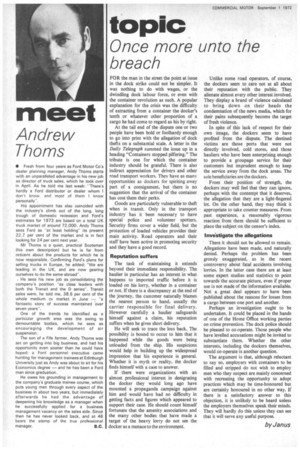topic
Page 44

If you've noticed an error in this article please click here to report it so we can fix it.
Once more unto the breach
FOR the man in the street the point at issue in the dock strike could not be simpler. It was nothing to do with wages, or the dwindling dock labour force, or even with the container revolution as such. A popular explanation for the crisis was the difficulty of extracting from a container the docker's tenth or whatever other proportion of a cargo he had come to regard as his by right.
At the tail end of the dispute one or two people have been bold or foolhardy enough to go into print with the allegation of dock thefts on a substantial scale. A letter in the Daily Telegraph summed the issue up in a heading "Containers stopped pilfering." The tribute is one for which the container industry should be grateful. There is also indirect appreciation for drivers and other road transport workers. They have as many opportunities as dockers for spiriting away part of a consignment, but there is no suggestion that the arrival of the container has cost them their perks.
Goods are particularly vulnerable to theft when in transit. Only in the transport industry has it been necessary to have special police and volunteer spotters. Security firms cover a wider field, but the protection of loaded vehicles provides their main activity. Road operators and their staff have been active in promoting security and they have a good record.
Reputation suffers The task of maintaining it extends beyond their immediate responsibility. The haulier in particular has an interest in what happens to imported traffic before it is loaded on his lorry, whether in a container or not. If there is a discrepancy at the end of the journey, the customer naturally blames the nearest person to hand, usually the carrier responsible for final delivery. However carefully a haulier safeguards himself against a claim, his reputation suffers when he gives short delivery.
He will seek to trace the loss back. The possibility is bound to occur to him that it happened while the goods were being unloaded from the ship. His suspicions would help in building up the widespread impression that his experience is general. Whether it is myth or reality, the docker finds himself with a case to answer.
If there were organizations with an almost professional interest in denigrating the docker they would long ago have mounted a propaganda campaign against him and would have had no difficulty in getting facts and figures which appeared to support their case. He should count himself fortunate that the amenity associations and the many other bodies that have made a target of the heavy lorry do not see the docker as a menace to the environment.
Unlike some road operators, of course, the dockers seem to care not at all about their reputation with the public. They alienate almost every other interest involved. They display a brand of violence calculated to bring down on their heads the condemnation of the news media, which for their pains subsequently become the target of fresh violence.
In spite of this lack of respect for their own image, the dockers seem to have profited from the dispute. The destined victims are those ports that were not directly involved, cold stores, and those hauliers who have been enterprising enough to provide a groupage service for their customers but imprudent enough to keep the service away from the dock areas. The sole beneficiaries are the dockers.
From their position of strength, the dockers may well feel that they can ignore, perhaps with the contempt that it deserves, the allegation that they are a light-fingered lot. On the other hand, they may think it appropriate to take counter measures. From past experience, a reasonably vigorous reaction from them should be sufficient to place the subject on the censor's index.
Investigate the allegations There it should not be allowed to remain. Allegations have been made, and naturally denied. Perhaps the problem has been grossly exaggerated, as in the recent controversy about fatal accidents involving lorries. In the latter case there are at least some expert studies and statistics to point towards the accurate picture, even if proper use is not made of the information available. Not a great deal appears to have been published about the reasons for losses from a cargo between one port and another.
Perhaps an investigation ought to be undertaken. It could be placed in the hands of one of the Home Office working parties on crime prevention. The dock police should be pleased to co-operate. Those people who have levelled accusations might be invited to substantiate them. Whether the other interests, including the dockers themselves, would co-operate is another question.
The argument is that, although reluctant to say so, employers with containers to be filled and stripped do not wish to employ men who they suspect are mainly concerned with recreating the opportunity to adopt practices which may be time-honoured but are certainly honoured in no other way. If there is a satisfactory answer to this objection, it is unlikely to be heard unless the employers themselves speak their minds. They will hardly do this unless they can see that it will serve any nseful purpose.
by Janus


































































































